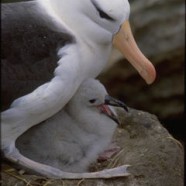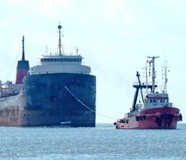Today, when you eat tuna, you’re killing an albatross.
Seabirds are victims of oil spills and other pollution. Plastic waste and ghost nets drifting in oceans are also threats along with invasive rodents on the shoreline. They are also victims of tuna fishing.
Urgent mitigation measures need to be taken by ICCAT to reduce by-catch of seabird populations such as albatrosses and petrels in tuna and tuna like species long-line fisheries. Recent worldwide estimates of seabird by-catch by long-line fisheries range between 160,000 and up to 320,000 each year of which a large proportion are albatrosses and petrels. It is estimated that the Japanese tuna fleet kills over 20,000 seabirds per year which seriously impacts albatross populations. According to a document presented to the Scientific Committee it is estimated that around 10,000 seabirds are victims of incidental catch every year within ICCAT’s zone of competence. Albatrosses are surface feeders and wait for the fishermen to throw out the fishing gear. Whereas petrels, such as white-chinned petrels (Procellaria aequinoctialis), plunge into the water depths to steal the bait, they become hooked, dragged along and eventually drown.
Will the “Arab Spring” be beneficial for Bluefin Tuna?
The 22nd regular meeting of the ICCAT is part of the Mediterranean Basin progressive political framework that focuses on the fishing of Bluefin Tuna. A number of NATO and military ships from ICCAT member states, in particular France and Italy, were busy around Libyan water and the Gulf of Syrte. Tuna fishing boats and their escorts have been sending Vessel Monitoring System (VMS) signals from this area prohibited from Bluefin fishing with a peak of activity in May and June.
Shipscrapping: Worse than Clemenceau
Despite virtuous official speeches and the European regulations on the exportation of waste, the flight of European ships to Asian shipyards continues. The same sleight of hand repeats tirelessly: miraculous sale to a non-European ghost ship owner, de-flagging under lax colors and incognito scrapping.
The latest of these European ships on their last legs are SeaFrance Renoir and SeaFrance Cezanne ; the former having just arrived at Alang, the latter, expected to arrive in the next few days.
To make matters worse, the two ships were owned by a subsidiary of a public company, SNCF. Despite statements of intent, exemplary conditions are once again missing. Other French victims of inertia and hypocrisy, the demolition yards required during the Clemenceau’s case by environmental organizations, trade unions and even the Grenelle Environment Forum and Grenelle of the Sea, are stayed dead.
SNCF exporting waste to India
SeaFrance, subsidiary of the SNCF (french national railroad company), sold the two car ferries SeaFrance Cezanne and SeaFrance Renoir in the Port of Dunkirk this summer. They were sold to two Panamanian companies who then immediately replaced the French flag with that of Belize.
The Cezanne and Renoir were decommissioned in February and September 2009 respectively. The Renoir, renamed Eastern Light, now sits off the Bay of Alang waiting for authorization to be beached and dismantled.
This tragic and particularly hypocritical outcome was instigated by a French shipowner of which the state owns 100%.
“Shipbreaking” # 25
Discover the awful story of Canadian Miner. A ship sent to Turkey for demolition Turkey and then ran aground off Cape Breton in Nova Scotia. Plus, the Iraqi Al-Zahraa, Saddam Hussein’s tank carrier locked down for 21 years at Bremerhaven, was sent Lithuania for demolition. Learn about Monte Stello, a Corsican car ferry, pronounced defunct after running a shore in Sardinia on January 1, 1994. It then resurrected in Norway, resold in New Zealand and destroyed in China. Read about Zoé, a Greek cruise ship, that never sailed and was sent for demolition in Turkey. Count the old petroleum tankers who head to Pakistan’s beaches, escort by the perpetual movement of boats that head to destinations far away. Follow Probo Koala step by step.











